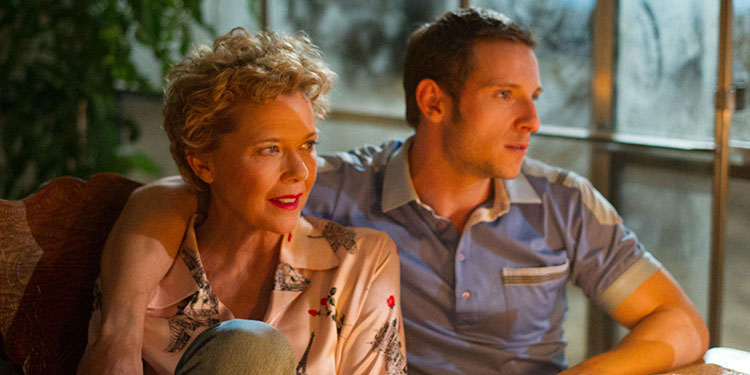
Director: Paul McGuigan
Running Time: 105 mins
Certificate: 15
Release Date: March 19th 2018 (UK)

In the late 1940s and 1950s Gloria Grahame was a big name Hollywood actress, known for the likes of The Big Heat (1953) and Oklahoma! (1955), as well as winning an Oscar for The Bad and the Beautiful (1952). However, her star power soon faltered.
Film Stars Don’t Die In Liverpool picks up her story in the 1970s, by which time Grahame (Annette Bening) is appearing in theatre in Britain. The older star meets the much younger Peter Turner (Jamie Bell), with a May-December romance developing. Grahame is flattered by the attentions of the younger man, while Turner is impressed by his beau’s celebrity – something that’s beguiling and exotic for a working-class Liverpudlian lad.
What starts as an unexpected fling develops into something stronger and more long-term, with Turner heading to the States where he discovers more about what’s it’s like to be a former star, and tries to figure out what he’s supposed to do other than being her boy toy. When serious illness strikes their connection is tested to the limits, with Gloria retreating to the unlikely surroundings of Peter’s family home, to be looked after by his mother (Julie Walters), father (Kenneth Cranham) and brother (Stephen Graham),
Based on Turner’s memoir, as the title suggests it’s a seemingly unlikely true story, but one that’s interesting and told with warmth and empathy. Grahame may not be well known to most people today, but the film does a good job of putting her and her life in context, helped by an excellent performance from Annette Bening in the central role. It would have been easy to play her as a tragic figure – cast aside by Hollywood and relegated to doing provincial theatre in Britain – but the script and Bening don’t do that, instead making her strong and fiery, but with a streak of being a lost soul.
Despite their different backgrounds and ages, the movie does a good of showing why the lovers’ personalities would connect.
One moment that is potentially problematic though is where Grahame and Turner admit to one another that they’re bisexual and have previously had same-sex lovers. I presume the makers did it because they didn’t want to completely ignore that side of their lives (and be accused of bi-erasure), but the way it’s done – as if it’s a major but completely random confession, but is then never mentioned or hinted at again – comes across as odd and verges on feeling as if they’re just underlining how little they care about that aspect of their personality. Maybe I’m just being overly sensitive though, as a few years ago it’s likely it wouldn’t have been mentioned at all.
It is a good movie, but not a great one. It’s interesting, well-acted, nicely written and competently directed, but it never quite catches fire in the way it might have. I’m glad I watched it though, and it’ll certainly satisfy fans of romantic drama, along with those who like a bit of Hollywood past.
Overall Verdict: A genuinely interesting story of what happens after Hollywood fame, with a couple of great performances from Bell and Bening. However, while it’s good it’s not quite the firecracker it constantly hints it could have been.
Reviewer: Tim Isaac
Leave a Reply (if comment does not appear immediately, it may have been held for moderation)